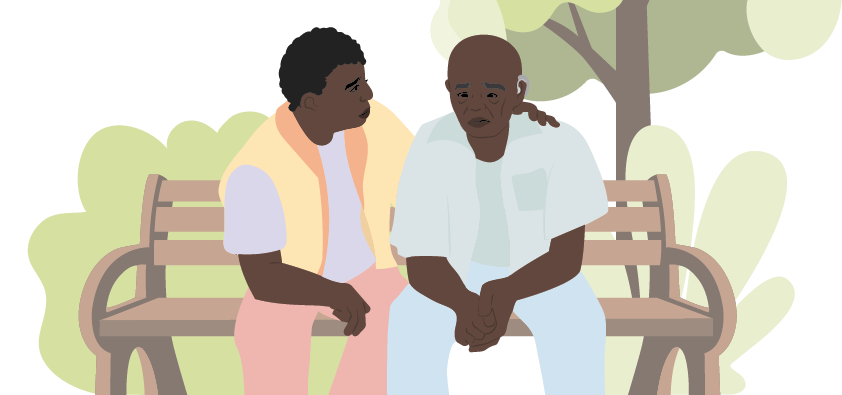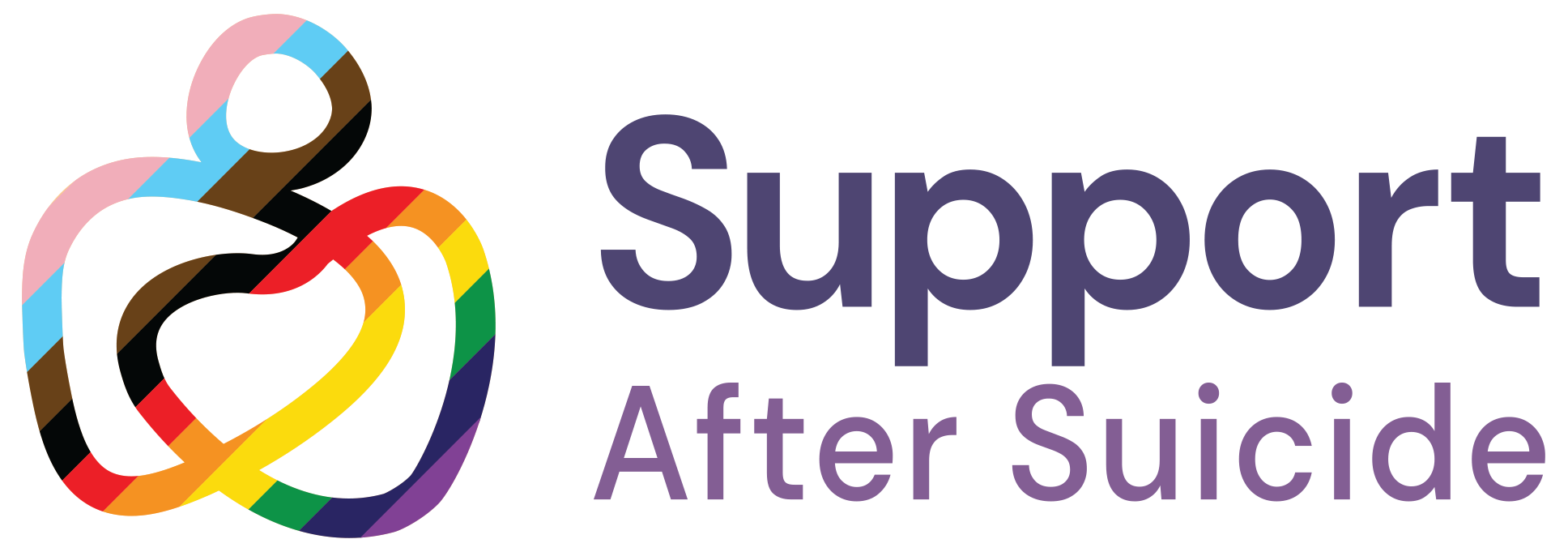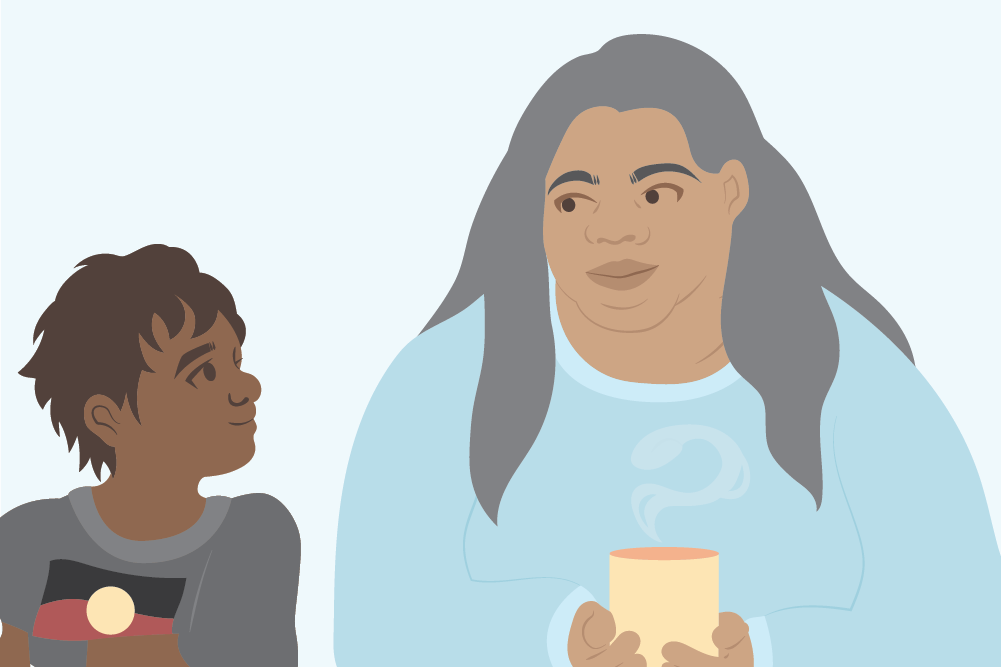
Suicide bereavement challenges
Caring for and supporting a person who has lost someone to suicide can present challenges:
- they may be struggling with emotions such as guilt, fear, anger, and shame, well beyond what they have experienced previously
- you may find it difficult to understand the depth of distress
- you may have a sense of not knowing what to say and feel concerned about saying the wrong thing
- you may worry about what the bereaved person is saying or doing and whether it’s ‘normal’
Being LGBTQIA+ and bereaved
LGBTQIA+ people can face unique challenges in our bereavement that can cause us additional distress and isolation. We may face barriers accessing support, talking about our loss, or have our experience denied or dismissed due to stigma and discrimination. We may be grappling with the knowledge that our communities are more impacted by suicide and grieving this too. All bereaved people need compassion, recognition, and validation of their experience. For LGBTQIA+ people, having the depth of what we’re going through recognised by others can help us to feel cared for. Being informed on LGBTQIA+ experiences of bereavement can help you to feel more equipped to support someone. To further educate yourself on the experiences of LGBTIQIA+ people bereaved by suicide, you can:
- read SASH’s resource Experiencing Bereavement
- check out SASH’s Real Stories section for videos, audio, and written stories by LGBTQIA+ people bereaved by suicide
- listen to the podcast Let’s Talk About Suicide
- contact QLife to speak to an LGBTQIA+ peer
Feeling cared for
While it may not take the grief away, we know that support from the network that surrounds a bereaved person can make all the difference. In short, this looks like the bereaved person:
- being listened to and understood
- having opportunities to tell their story, often repeatedly
- being able to express their grief in their own way
- having no expectations placed on them in terms of how to express their grief or how long they spend grieving
Providing support
When we want to support someone grieving after suicide, we can worry about what to say or do, and what not to say or do. Remember that this type of bereavement is long-term, and you won’t be able to ‘fix’ it or make it go away. Intense feelings can come in waves, knowing that each wave will subside can make it easier to provide support. People usually need support for a long period of time, as they come to terms with what has happened. Varying types of support can be provided during this time, practical and emotional.
Emotional support
To help the bereaved person feel emotionally supported, try to:
- keep in touch; contact the person when you hear of the death and express that you're sorry to hear of their loss. Maintain contact personally or by phone, text, notes, cards
- ask “How are you getting along?” and then really listen to understand and reflect, not just to respond. Allow the person to speak however difficult and complex it is
- be patient; people may need to tell their story over and over without interruption or judgement
- accept the intensity of their grief and right to grieve in the way that is most comfortable for them. Allow for behaviour such as crying, being quiet, laughing, expressing anger, guilt, and blame
- invite them to talk about the person who has died. Ask to see photos and hear stories. Mention the person by the name and pronouns they went by
- recognise that stigma around suicide can discourage people from sharing. By speaking about suicide, we can reduce stigma and show our openness towards being confided in
- be led by the bereaved person on the kind of support they need. You can ask someone what feels most helpful to them. They may say ‘I don’t know’, that’s okay too. You can tell them you’re open to exploring different approaches to see what feels best for them
- be aware of and honest about your limitations: acknowledge if you don’t understand or know how to react to what they are going through
- be aware of and acknowledge special times that might be significant, and particularly difficult, for the bereaved person such as anniversaries and birthdays, etc
Try to avoid:
- saying ‘committed’ suicide. This language can suggest suicide is a crime or a sin, which can be distressing for bereaved people and LGBTQIA+ people. Instead, you can say died by suicide, suicided, or took their life
- relying on clichés and platitudes to comfort. While well-intentioned, saying things like ‘you’re so strong’, ‘time will heal’, ‘they’re at peace now’, or ‘I know how you feel’, can leave the bereaved person feeling misunderstood
- simplifying suicide. Suicide is complex, there are usually many contributing factors
- asking about the method of suicide. Discussing graphic details can be traumatising for bereaved people and those supporting them
- making judgments about the person who suicided such as describing them as selfish, cowardly, weak, or even brave or strong. Reserving judgement creates room for bereaved people to come to their own understanding of their loss

Practical support
Bereaved people are likely to feel overwhelmed and exhausted. They may find it hard to ask for help or identify ways you can help.
Offering tangible help can reduce the workload of the bereaved person during this difficult period. You can take initiative and offer to do something specific. For example, cooking meals, mowing the lawn, or looking after children occasionally.
Self-care
We must care for ourselves to keep showing up for others; you can’t pour from an empty cup.
- look after your basic needs. To maintain energy we need sleep, nourishment, and community
- be open with the person grieving around when you are or are not available
- we need more than one person. Help form a support network for the grieving person. Besides yourself, this can include others in the bereaved person’s life like friends and family. You can speak with them about accessing peer support groups, mental health professionals and helplines such as QLife or Peer CARE Companion Warmline
- turn to your own support network. Confide in the people who support you about how you are going and what you need
- continue engaging in activities that fulfil you. This could be socialising, creative pursuits, hobbies, or rest
LGBTQIA+ children and young people
It can feel daunting to support LGBTQIA+ children and young people at this time. Children and young people will have their own needs and will be grieving differently to the adults around them. They may have lost someone who is also LGBTQIA+, be facing discrimination at home, school or online, or lack spaces to talk about what they’ve experienced.
While more LGBTQIA+ children and young people are feeling supported by friends and family (ARCSHS, 2021), there is more to be done to tackle discrimination and provide the respect and support they need.
Below is a list of services that work with LGBTQIA+ young people and can help you support them in their grief.
Nationwide
- Support After Suicide website has information about how to communicate with children bereaved by suicide
- QLife is an LGBTQIA+ peer support service that speak to parents, family, and others who support LGBTQIA+ young people and children. QLife can provide peer support and referral via phone or webchat
- PFLAG+ groups support parents and friends to support their LGBTQIA+ loved ones with knowledge, acceptance, love, and pride. There are groups in every state and territory
- Transcend provide information, peer support and community connection for parents and families of gender diverse children. There are groups in every state and territory
State specific
- New South Wales – Twenty 10 provide counselling and social support groups for LGBTQIA+ young people 12-25 in New South Wales both online and in person
- Queensland – Open Doors Youth Service provide counselling and social support groups for LGBTQIA+ young people 12-25 in Queensland
- South Australia – Bfriend Parent Volunteers can provide phone or in-person support to other parents of LGBTQIA+ young people.
- Tasmania – Working It Out provide counselling, social support and resources for young people under 18, their parents and families in Tasmania
- Victoria – Support After Suicide provide counselling support and peer support groups for young people bereaved by suicide
- Western Australia – Freedom Centre provide drop-in sessions, counselling, and peer support for LGBTQIA+ people 12-26 and their families in Western Australia
Hill et al., (2021). Writing Themselves In 4: The health and wellbeing of LGBTQA+ young people in Australia. National report, monograph series number 124. Melbourne: Australian Research Centre in Sex, Health and Society, La Trobe University. DOI: 10.26181/6010fad9b244b


